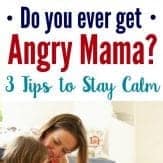Inside this post: One simple strategy to help you cope with parenting anger and stop yelling. If you’ve ever felt like an angry mom, this will help turn any bad day around.
I put my heart into my kids that day, taking them to the indoor playground, visiting a special burger joint for lunch and spending several hours roughhousing and playing with them to re-connect.
And now…
NOW that I needed them to do ONE thing for me — get through two quick errands — they were melting down and grandstanding in the parking lot.
I was ready to flip. my. lid.
One screaming kid was under my arm like a sausage, and the other screaming kid was laying on the ground of the parking lot. I gritted my teeth like a vise grip and uttered those words:
“Get. Up. Right. Now. And. Get. Into. The. Car.”
I was mad.
So mad.
As I sat in the driver’s seat with both kids screaming in the back, my mind raced through the day’s events: The lack of thank yous. The eye-roll getting out the door in the morning. The not listening in the parking lot.
All the minor infractions that occurred earlier in the day were now compounded interest. And I wanted my debt paid back — in full.
The parenting anger inside my head was like…boiling lava.

This post contains affiliate links as part of the Amazon affiliates program, which means if you make a purchase, at no additional cost to you, I will earn a commission. See our full disclosure policy here.
Something had to change.
Parenting anger is something deep inside you. You rarely talk about it because getting angry at your kids exemplifies your imperfections as a parent.
And that’s a vulnerable place to visit.
The stares. The comments. The advice. You don’t want all the outsiders to think you’re a terrible jerk of a mom for losing it on your kids. Because you’re supposed to have it altogether.
Right?
But here’s the hardest part…
The thing that needed to change was…me.
It’s not the parenting anger that was the problem. The problem was that I was denying my feelings of anger, frustration and sadness throughout the day with my kids.
I stuffed everything that bothered me back inside. I never communicated any of it in a healthy way.
Kids won’t get out the door in the morning…stuff that frustration back inside.
Kids fight incessantly in the car…stuff that frustration back inside.
Kids eat 2 month-old french fry off the car floor…close your eyes!
The end of each day culminates into one massive emotional burst that has nowhere to go but out your mouth and into the air surrounding you.
Related: How to Stop Your Child From Whining — Immediately
I made one simple change.
When something bothered me, I told my kids. Without blame, shame or punishment, I simply told my kids what I was feeling.
According to a brain imaging study by UCLA psychologist Matthew D. Lieberman, verbalizing our feelings makes our sadness, anger and pain less intense.
“When you put feelings into words, you’re activating this prefrontal region and seeing a reduced response in the amygdala,” he said. “In the same way you hit the brake when you’re driving when you see a yellow light, when you put feelings into words, you seem to be hitting the brakes on your emotional responses.”
What Lieberman basically says is that sharing your feelings out loud calms the emotional center (the amygdala) of your brain, enabling you to move forward calmly, rather than build and explode later.
When I got upset with my kids, I started saying things like:
- “You’re not listening and I’m frustrated.”
- “You keep fighting with each other and I’m angry.”
- “You’re eating moldy fries off the car floor and I really don’t like that!”
I even started sharing more happy feelings too:
- “We had so much fun at the park together and I loved it.”
- “You helped me cook dinner and I’m happy.”
- “You were cooperative at bedtime and I’m peaceful.”

Because you’re human; you feel things too.
There was a deep-seeded belief inside of me: I thought it wasn’t okay to tell my kids “bad” feelings.
I thought I was supposed to holler at them once they angered me off enough and they were supposed to know that what I really meant was “I’m frustrated.”
Not surprisingly, they had no idea why I was so angry. Because it came out of nowhere. And I let it happen that way.
Related: 9 Genius Phrases for Dealing With a Strong-Willed Child
3 more reasons sharing your feelings helps.
1. Your emotions quit building throughout the day. And instead of one inevitable explosion, you’ll release and process the emotions as they happen.
2. You’ll start to model how to manage, process and share angry feelings with your kids – and this is powerful. Your kids are looking to you, and they want to see how to share emotions in a healthy way.
3. Your kids will start to shift their behavior (slowly). Learning about emotions is a big task, but once kids start to understand more about your emotions, they will start to shift their behavior based on what you share.
I often think back…
…to that day in the car when the kids were screaming. It serves as a reminder for how far I’ve come.
The parenting anger stopped building. It stopped getting stuffed back in. It’s no longer hidden.
Through transparency and honesty with our emotions, we re-connect with our kids.
We arrive at a place of truth. We realize that both parenting and childhood are filled with emotions across the spectrum. And we share those emotions (even the angry ones) in a healthy way.
And together…we move forward.

Print this free self-care habit tracker
This post comes with a free self-care habit tracker printable to help make yourself a priority in the everyday moments.
Here’s a sneak peek…
Download Your Free Printable
- Download the checklist. You’ll get the printable, plus join my weekly newsletter!
- Print. Any paper will do the trick, but card stock would be ideal.
- Place it on your refrigerator. Check things off as you go and don’t forget a thing!
Resources for a calmer home:
- The Most Important Words You’ll Ever Say to an Upset Child
- Parenting Anger Isn’t The Problem: How to Communicate With Kids Effectively When You’re Angry
- The Most Important Thing You Can Do After You Yell at Your Kids
- 8 Ways to Get Your Kids to Listen Without Yelling
Want more on parenting?
- How to Handle Back Talk and Disrespect Like a Parenting Warrior
- 2 Year-Old Not Listening? Try This Remarkable Tip
- The Real Reason Why Kids Never Want to Go to Sleep
- 10 Powerful Responses When Your Child Whines or Complains
I've created a free email series just for you!
If you are struggling with feeling happy in motherhood, let me help you streamline your family's daily routines so you can enjoy your family life without the stress. Yes, really. I've seen my routines work time and time again for parents. I know it can work for you too.
This free email series will help you:
- Free sample routines for your child
- Best morning routine tips and tricks your kids will actually follow
- All-time favorite parenting hacks for getting more cooperation at bedtime
- Step-by-step guide for using a printable daily schedule with kids










What a helpful post! I didn’t even realize I was doing this, I can’t wait to try your method of sharing regularly instead of stuffing down and exploding (guilty)! Thank you!
I’m so glad this spoke to you, Carla! Thank you for reading.
How true! My toddler was very surprised to hear I was getting frustrated and angry with her behavior, and verbalizing my feelings actually modified her actions. It’s so easy to forget that toddlers do not have the social sophistication to pick up on the nuance cues of our emotions at that moment!
Neither do husbands! lol This is good advice for more than just the kiddos!
I LOVED this! I appreciate your examples of how to verbalize this to your children.
Thank you so much for this! I’ve been having a really hard time with my almost six year old son this summer. In fact it’s been all year long. Before summer came I’m sad to say I dreaded the weekends. I couldn’t wait for school on Monday because I was so tired of yelling at him for the same things over and over again. I’ve tried to change and not be a yeller but it’s so hard. You’re right. It builds all day long until I snap! My little boy is only going to be six years old. I want to enjoy every minute with him and my daughter ( 10 months old). His poor sister screeches at him because she’s so used to hearing me yell. It makes me feel like I’m failing them both. It’s not healthy. My son now responds much in the same way that I do and yells and screams at me when I punish/ discipline him, only he actually throws a tantrum and wails and throws his body around. He and I have had a lot of changes in the last two years and I’m afraid I didn’t do a good enough job making sure he was adjusting properly. He’s like me and says he’s ok when he really isn’t because he’s not sure how to express what he’s feeling.
I can’t wait to try this tomorrow! It’s a new day, a new me! We will get through this!!
Thank you so much for sharing, Kate.
I really appreciate reading through articles like this one. I’m a stay at home dad with little experience with children before my son, and even after searching for articles or other advice online, they all feel somewhat hollow or patronizing, seeming to say that it’s fully the parent’s fault. This article sounds what happens when things get out of control. I’ll be putting this into practice both for myself, and because I need to teach my son how to process his emotions. Thank you!
Grant, Thanks for your honest and thoughtful feedback here! Anger in parenting is a very natural emotion because parenting is really, really hard! You have to think, “why would a great parent get angry?” There’s always a reason – built up life stressors, lack of support in your nearby community, frustration with knowing and feeling equipped to raise kids in the modern world. When you think about it, of course, parents would struggle with anger. Now you have something to work with and you can begin to implement coping strategies that you feel good about. The emotion is always right – it’s processing that emotion that requires thought and effort.
This completely resonated with me today. Bedtime was rough and I hate the kids going to bed when the last thing they hear in my voice is frustration and anger.
Tomorrow is a new day and I am going to put these tips into action. Thank you!
Another thing I found very helpful is to write down when, how, where, and my thoughts on why I was triggered in a moment. I quickly realized I was struggling with frustration about being interrupted (I can’t multi-task, but who can?). Becoming aware of my triggers helped me to start saying to the kids things like…”I need 2 more minutes to finish this task, than I can come talk to you about that.” We can only change the things we are aware of.
How do you deal with a 27 month old who due to the terrible twos
throwing a tantrum because he can’t do something or throw everything off Kitchen table
when he can’t get his way.
I felt like lava was erupting when he did this.
You really can’t reason with a 27 month old.
What can you do not to yell. etc.